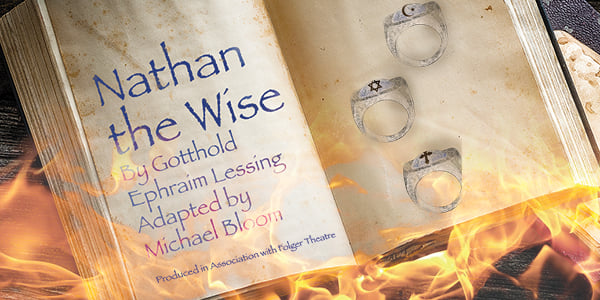Michael Bloom’s adaptation of Gotthold Lessing’s 18th-century play of enlightenment rationalism and religious tolerance, Nathan the Wise, now playing at Theater J, has at its core not one but two wise men.
Nathan (Eric Hissom), a prosperous Jewish merchant, is regarded by everyone from the outset as a wise, good man, a reputation that Nathan deserves and, in Hissom’s characterization, carries gracefully and modestly. He is someone who maintains an even keel, preferring to think his way through even difficult circumstances rather than reacting to the emotions of the moment.
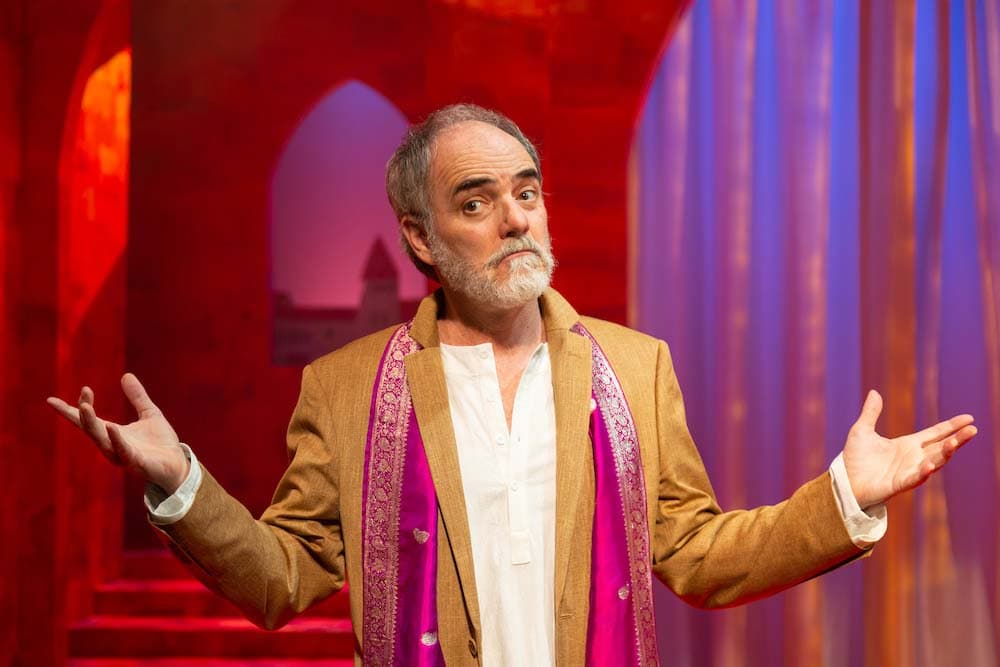
Salah ad-Din, a compelling historical figure, managed the impressive feat of being admired by all sides in the complicated, chaotic, often vicious geopolitical and religious wars in the 12th-century Middle East. Played with convincing restraint by Maboud Ebrahimzadeh, Salah ad-Din is the quintessential reasonable man, who achieves his objectives not only by military prowess and political shrewdness but by compassion, mercy, and willingness to learn from others. Like Nathan, he is a master of self-control, which allows him to successfully rule 1192 Jerusalem, at the end of the Third Crusade.
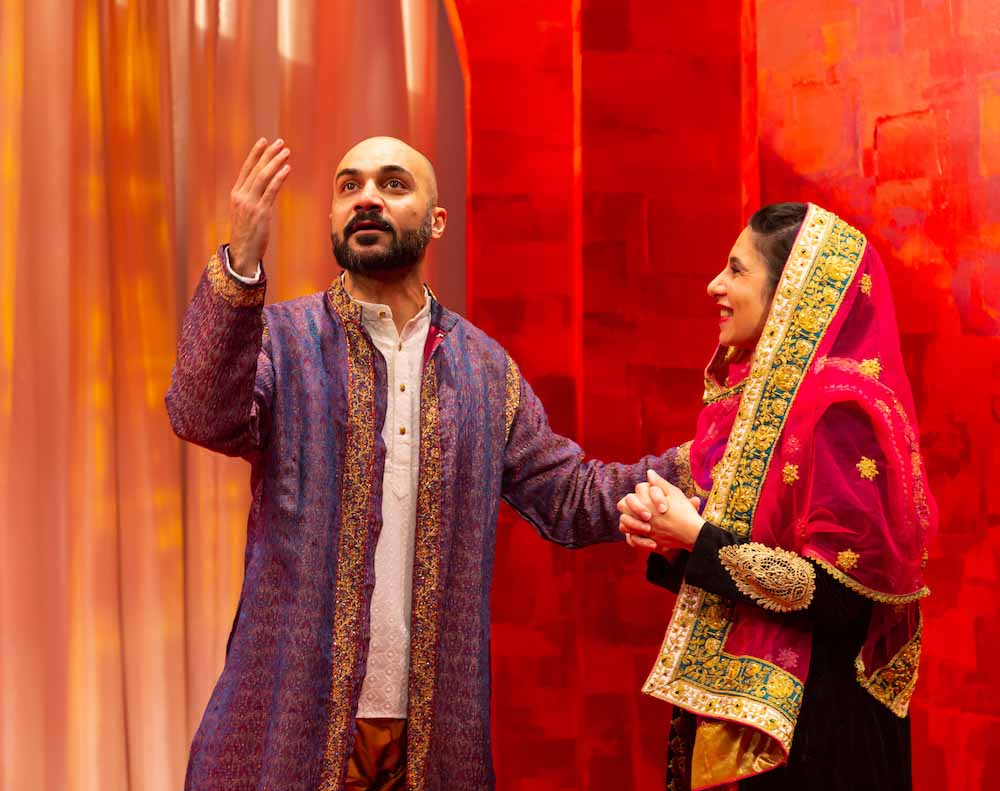
Both principal characters have a weakness, however. Nathan holds a potentially devastating family secret, while Salah ad-Din is not skilled, or even very interested, in financial administration. It is the Sultan’s financial straits that result in his calling Nathan to a meeting. Neither man wishes to discuss overtly the subject of money. Instead, Salah ad-Din prompts a discussion of the comparative validity of the religions swirling around Jerusalem. Nathan responds by telling a fable of “three rings,” which is the thematic center of the play, emphasizing the value, to God and humanity, of all the major faiths prominent in that city.
Before the action of the play, Salah ad-Din had spared the life of a young Christian Knight Templar (Drew Kopas), because he resembled Salah ad-Din’s dead brother, setting the plot in motion. While Nathan was out of town on business, the Templar saved his daughter, Rachel (Em Whitworth), from a house fire. After some hesitation stemming from his ingrained antisemitism, the Templar finds himself head over heels in love with Rachel, wanting to marry her on the spot. Kopas plays the character as the perfect type of immature impetuosity, to fine comic effect. The script does not give Rachel much to do beyond being an ingénue, albeit one with a touching loyalty to her father.
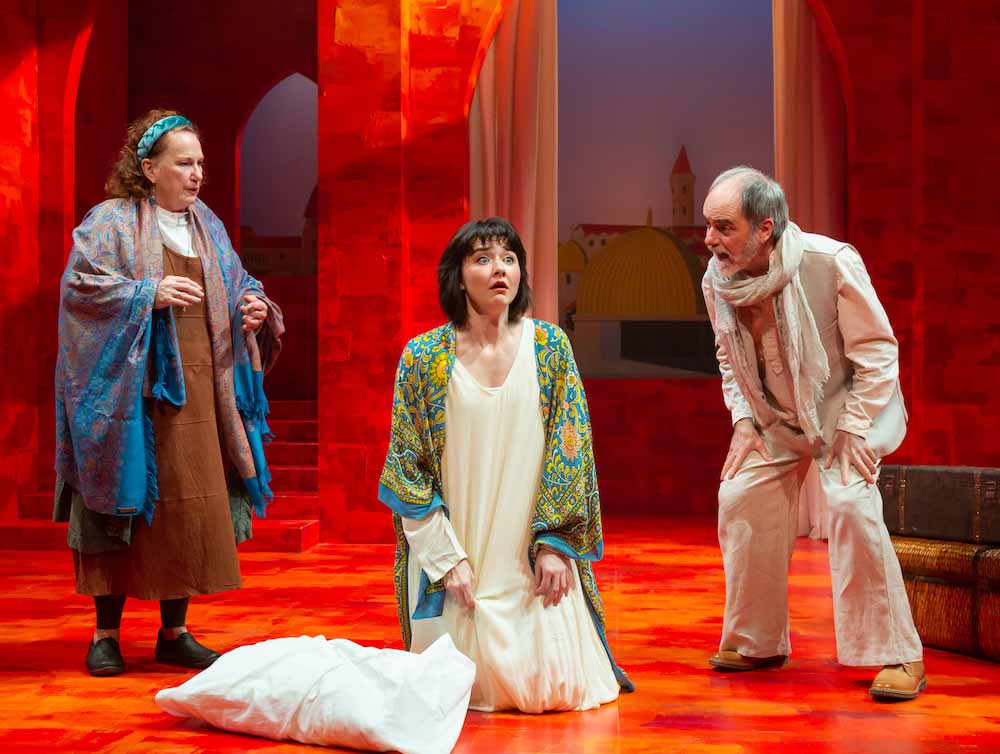
Supporting characters include Al-Hafi (Sorab Wadia), a cheerful though impractical Sufi friend and chess partner of Nathan; Sittah (Sarah Corey), the Sultan’s politically savvy and very practical sister; the Friar (James A. Johnson), who ultimately helps find a solution to the tangled family relationships of the play; Daya (Jo Twiss), a down-to-earth but conflicted governess who has helped to raise Rachel; and the Patriarch (John Lescault), a punitively-inclined churchman, lacking only a handlebar mustache twirl to be a classic melodrama villain. All give good accounts of themselves.
Bloom’s adaptation and Adam Immerwahr’s direction emphasize the comic possibilities of the play, avoiding having a play about serious ideas become didactic. There are many funny lines to tickle the audience and equally funny nonverbal reactions from the cast. Credit is due the director and cast for spot-on timing in both the serious and comic moments. The comic aspect of the play takes over for good toward the end as, in what feels like a mashup of Gilbert and Sullivan and Star Wars, surprising revelations of unsuspected family ties, secrets told, and coincidences explained get everyone (except the villain) dancing happily together, a single family created from differing and sometimes clashing backgrounds and perspectives.
A beautifully painted red arch, with mottled yellow, purple, and darker accents, dominates Paige Hathaway’s set, with two upstage arches (the larger sometimes covered by a thin curtain) offering views of the cityscape beyond. Colin K. Bills’s lighting design is subtly effective. Among Ivania Stack’s costumes, the Sultan’s suave fitted gray tunic, the Patriarch’s gaudy red ensemble, and the contrast between Al-Hafi’s normal colorful ragtag garb and his official green outfit during his brief stint as the Sultan’s financial manager stood out.
The program lists the place and time of the play as Jerusalem, 1192 “and Now.” The point is that, like many lasting works of art, Nathan the Wise lives simultaneously in three periods. There is 1192, when the action is set, in the midst of the Crusades. There is the 18th century, when it was written, in the midst of the European enlightenment. There is the present, when it is performed, in a time of intense political, religious, and ethnic strife. “Here’s an Enlightenment playwright writing a play set in medieval times, so he could distance himself from the arguments of his day,” Bloom commented in a March 17 interview in the Washington Post. “Maybe it will help us to get a similar perspective on the arguments of our day.”
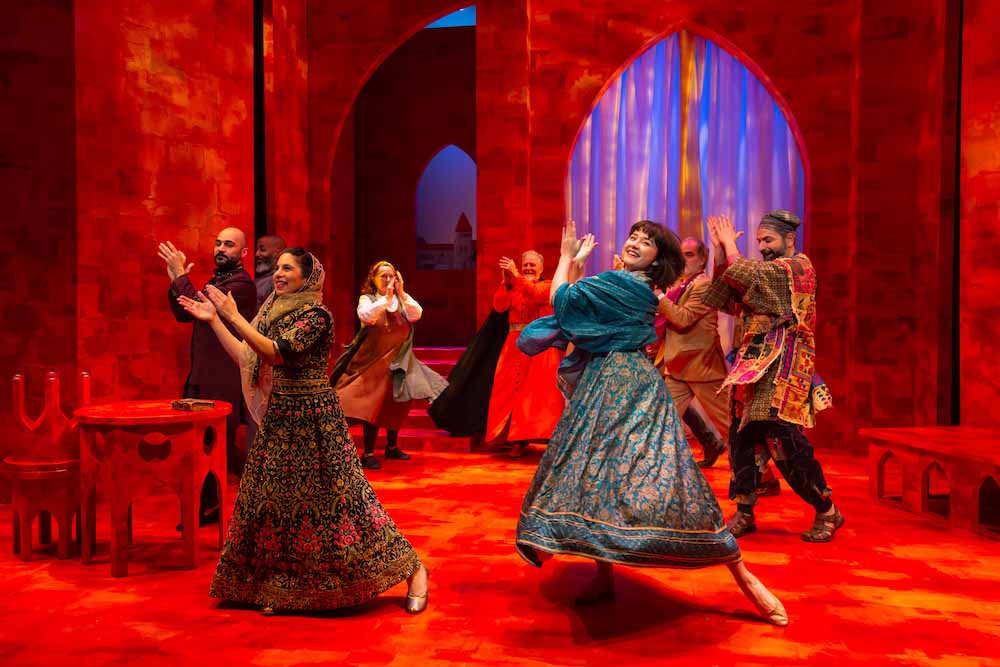
Given the history of both the Middle East and Europe in the centuries following 1192, through the present day, it is difficult to see that hope as more than aspirational. But an aspiration to wisdom, mutual understanding, acceptance of differences while peacefully sharing the planet, is one worth holding, a call to heed Lincoln’s ”better angels of our nature.” Meanwhile, Theater J’s Nathan the Wise (produced in association with the Folger Theatre) is a highly satisfying, well-acted, and tightly directed, expression of that continuing hope.
Running Time: Two hours 15 minutes, including one 15-minute intermission.
Nathan the Wise plays through April 10, 2022, presented by Theater J and the Folger Theatre performing at the Aaron & Cecile Goldman Theater in the Edlavitch DC Jewish Community Center, 1529 16th Street NW, Washington, DC. Purchase in-person tickets ($40–$60) online or by calling the ticket office at 202-777-3210.
Nathan the Wise also streams from March 29 to April 10, 2022. Streaming tickets ($60, good for viewing 10 AM to 11:59 PM ET), can be purchased online or by calling the ticket office at 202-777-3210.
The program for Nathan the Wise is online here.
COVID Safety: In accordance with the Edlavitch DCJCC policy, all individuals will be required to show proof of full vaccination each time they enter the EDCJCC by presenting either digital documentation on a smartphone or a physical copy of their vaccination card. Individuals with medical or religious exemptions to vaccinations will be required to show proof of a negative COVID-19 PCR test taken within 72 hours of their arrival to the EDCJCC. All patrons in the Goldman Theater will be required to wear masks. Only performers and guests invited onstage may be unmasked. Masks are optional but encouraged in the Q Street and 16th Street lobbies, hallways, and other public spaces. Theater J front-of-house staff and volunteers will continue to wear masks. For more information, visit Theater J’s COVID Safety Guidelines.
SEE ALSO:
Theater J program aims to diversify depictions of Jewishness onstage (season announcement)


